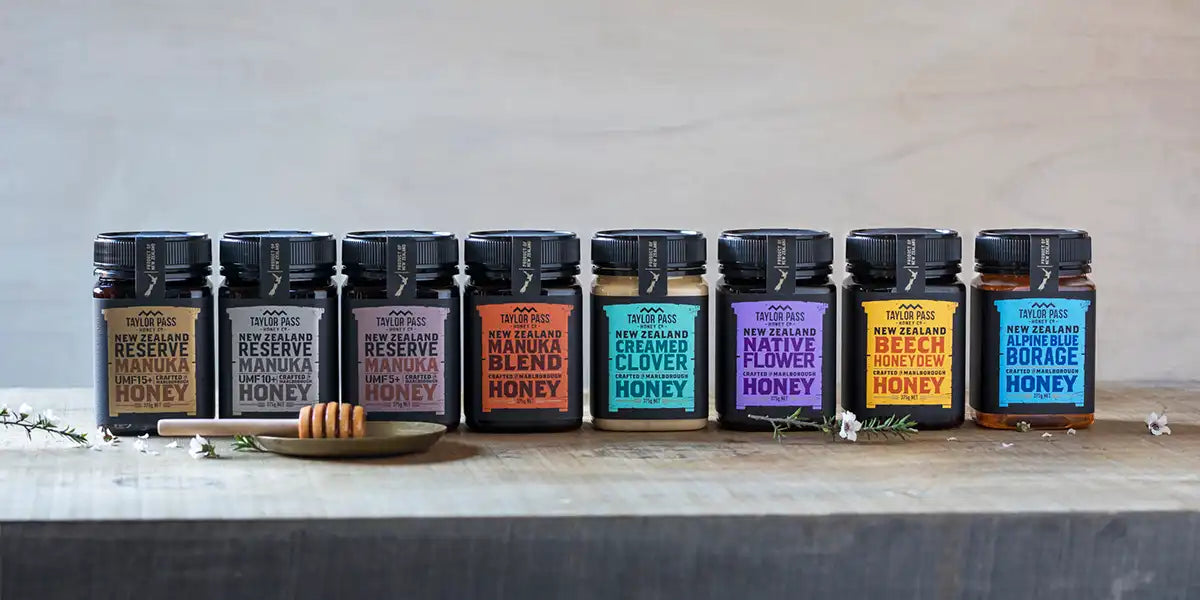Honey has been cherished as nature’s sweetener for centuries, but there’s one variety that stands out for its unique properties and benefits: Mānuka honey. Known for its distinctive taste and remarkable health benefits, Mānuka honey has become a staple in health and wellness practices around the globe.
Mānuka Honey vs. Regular Honey
Mānuka honey is produced by bees that pollinate the flowers of the Mānuka bush, which is native to New Zealand. This unique origin is the foundation of Mānuka honey’s distinctive characteristics. Unlike regular honey, Mānuka honey contains a high concentration of methylglyoxal (MGO), a compound believed to be responsible for its potent antibacterial properties. There is an independent accreditation called UMF, the Unique Mānuka Factor, which evaluates the quality and authenticity of Mānuka honey.
The UMF numbers demonstrate the overall potency of its antibacterial qualities. The higher the UMF grade, the more potent the Mānuka honey will be.
This honey is suitable for everyday use, immune support and general well-being.
Recommended for maintaining digestive health, soothing sore throats, and supporting overall immune system function.
Its potent antibacterial properties make it effective for treating cuts, burns, and skin infections. A great choice for therapeutic application when you are feeling unwell.

Monofloral vs. Multifloral Mānuka Honey
When exploring Mānuka honey, you’ll come across terms like monofloral and multifloral. These classifications refer to the source of the nectar used by bees to produce the honey. Both types of Mānuka honey have their own merits and can be chosen based on personal preference and specific health goals.
Monofloral Mānuka Honey: This type of honey is when the bees have pollinated mainly the nectar of manuka flowers. To qualify as monofloral Manuka Honey, the honey must meet strict standards set by the New Zealand government. Monofloral Mānuka honey also has higher levels of methylglyoxal, which is the source of the antibacterial properties, It is prized for its purity and potency, and therefore commanding higher prices due to its superior quality.
Multifloral Mānuka Honey: This variety is produced when bees gather nectar from both Mānuka flowers and other floral sources. While still beneficial, multifloral Mānuka honey generally contains lower levels of MGO and other active compounds compared to its monofloral counterpart. It offers a milder flavor and can be a more cost-effective option for those looking to enjoy the benefits of Mānuka honey without the premium price tag, especially when used as an ingredient in dishes that require cooking/baking.

Health Benefits of Mānuka Honey
Mānuka honey is celebrated for its superior therapeutic properties. These compounds are not found in the same concentrations in other types of honey, making Mānuka honey exceptionally effective for health and wellness applications. Here are some of the most notable health benefits:
- Antibacterial and Antimicrobial Properties: The high levels of MGO in Mānuka honey give it powerful antibacterial properties, making it effective against a range of pathogens. It's often used to treat wounds, burns, and infections, promoting faster healing and reducing the risk of infection.
- Digestive Health: Mānuka honey can aid in digestive health by balancing gut bacteria and reducing symptoms of digestive disorders like irritable bowel syndrome (IBS). Its natural prebiotic properties support the growth of beneficial bacteria in the gut.
- Immune Support: Regular consumption of Mānuka honey can boost the immune system, helping the body fend off illnesses and infections. Its antimicrobial properties contribute to overall immune health.
- Oral Health: Mānuka honey's antibacterial qualities can benefit oral health by reducing plaque buildup and combating harmful bacteria in the mouth. It can help prevent gum disease and soothe sore throats.
- Skin Health: Applied topically, Mānuka honey can improve skin conditions such as acne, eczema, and psoriasis. Its anti-inflammatory properties help reduce redness and swelling, while its antibacterial action fights skin infections.
How to Use Mānuka Honey
Mānuka honey's versatility makes it a valuable addition to your pantry and medicine cabinet. Its unique flavor makes it an excellent ingredient in both sweet and savory dishes. You can drizzle it over yogurt, oatmeal, or toast for a nutritious breakfast, or use it to sweeten smoothies and tea. It also pairs well with cheese and can be used in salad dressings, marinades, and baked goods. As a natural sweetener, Mānuka honey can replace refined sugar in recipes, allowing you to enjoy its health benefits while reducing your intake of processed sugars.
Beyond the kitchen, Mānuka honey can be applied directly to the skin as a natural moisturizer or included in homemade face masks and scrubs. Its antibacterial and anti-inflammatory properties make it an excellent treatment for acne and other skin conditions. For wound care, Mānuka honey can be used on cuts, burns, and minor wounds to promote healing and prevent infection.
To support your immune system, take a spoonful of Mānuka honey daily. You can consume it straight from the jar, mix it into warm water with lemon, or add it to your favorite tea.

Mānuka honey is more than just a sweet treat; it's a powerful natural remedy with a range of health benefits and uses. Whether you’re looking to improve your digestive health, support your immune system, or enhance your skincare routine, Mānuka honey offers a versatile and effective solution. Experience the difference for yourself and enjoy all the benefits this extraordinary honey has to offer at www.taylorpasshoney.com!


